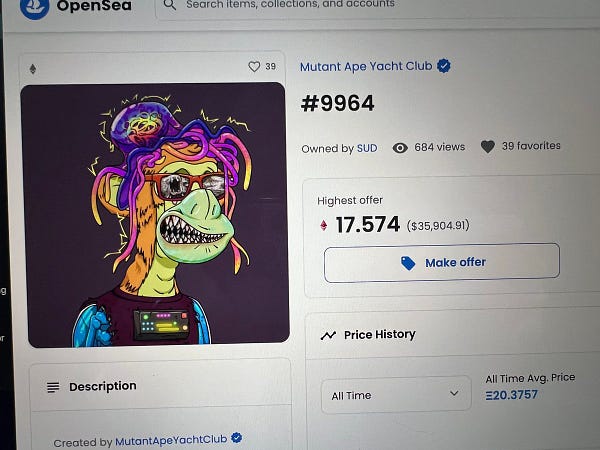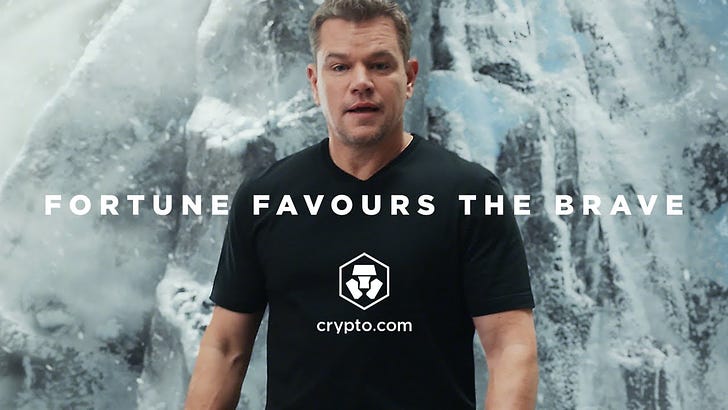Brands Entering the Market
How do you do, fellow kids? It is I, your friendly brand, here to talk non-fungible tokens. Bob from the IT department set us up with a MetaMask wallet and now we’re ready to explore the Metaverse with you! Anyways, here’s our logo on some wearables for your Decentraland avatar—pretty nifty, huh?
No longer satisfied with extracting likes from burns against their competitors on Twitter, brands have begun the process of seeking out web3 in order to get a piece of that sweet, sweet cryptocurrency.




That’s right, Wendy’s has secured a patent on the Wendyverse. And while many patents come to nothing or go unexplored, it at the very least demonstrates a certain level of interest in the field.
This is not just one or two forward-thinking companies. We’re talking: Bose, Burberry, Tiffany & Co., Netflix, MAC Cosmetics, Hello Kitty, Pepsi, Getty Images, Snapple, Budweiser, Kia, TIME, eBay, Gatorade, WWE, Johnnie Walker, Adidas, MLB, PUBG, Almond Breeze, Taco Bell, Gucci, Nike, and so much more. While the rate at which they’re entering the space may not be as quick as it was late last year, it’s only a matter of time before all major brands feel obligated to establish their web3 presence.
So what’s wrong with that? On the one hand, brands entering the space is a good indication that there is something of value here, and that they see beyond the outcries of the internet and realize some latent potential. That’s good, right?
Well, sort of, yes.
But for many, legitimate and lingering fears remain in regards to how much influence they’ll be able to exert on the market. As web3 is hailed as a decentralized, democratized space, it is understandable that many look to these companies with a certain level of hesitation (or outright contempt), worried that their unique, new thing will be co-opted by the same corporations that held them back in the first place.
Celebs Entering the Market
Celebrities too, have been entering the market, and at a much greater rate than the brands: Serena Williams, Eminem, Paris Hilton, Snoop Dogg, Reese Witherspoon, Matt Damon, Steve Aoki, Ellen, Grimes, Johnny Depp, Tony Hawk, Kings of Leon, Mike Tyson, Ozzy Osbourne—all have dabbled with NFTs to various extents. But that’s just a drop in the bucket, and the list of names grows longer with every passing day.



While some celebrities have managed to settle into the space and do well, the vast majority have not. Some may say that’s a risk for anyone jumping in early, to which I say, “fair enough”. But as someone who works full time in web3, it’s unfortunate when I see anyone who seems genuinely enthusiastic about the the space get burned.
Take Seth Green (Robot Chicken; Family Guy) who dropped his collection of 6969 PizzaBots in April of this year in collaboration with Heavy Metal Magazine. While it hasn’t exactly set the world on fire, Seth is obviously someone who is very interested in the field: he bought into a number of blue chip projects, and was even in production for a show called White Horse Tavern, a mixture of live action and NFTs, featuring Fred Simian, his Bored Ape (#8398) as the main character.
Unfortunately, the very next month, Seth lost much of his collection.





In the end, Seth manage to buy his Ape back and it looks like production of the show will be unaffected. But the news highlighted the legal gray area over copyright, and how theft in the space can complicate matters, especially during the production of a show whose entire concept revolves around a digital asset.
While Seth’s interest in the space may be genuine, there are many other celebrities for whom that may not be the case.
Chris Brown, best selling music artist with a penchant for R&B (and violence against women), seemingly appeared out of nowhere in order to launch his NFT collection Breezyverse, which at the time of this writing has minted out 843/10,000, despite launching at the end of June (I won’t be linking to his project, because as far as I’m concerned that’s 843 sales too many).
What I found interesting (and refreshing) about this release was that, despite his millions of fans and music sales, Chris failed to penetrate the market. There was an obvious disconnect between the project and his audience.
It has been proven time and time again that name clout only goes so far in this space—a bad project is a bad project, regardless of the subject or who is promoting it.
Then there are the celebrities not promoting a specific NFT collection, but cryptocurrency in general. Take Mark Cuban and his promotion of now bankrupt Voyager Crypto (which FTX and Binance are apparently looking into buying some of their digital assets), or Elon Musk’s on-again, off-again promotion of meme currency Dogecoin.
Matt Damon found himself in the public eye this year after his unfortunately timed advertisement for Crypto.com. Originally released at the end of October 2021 when BTC and ETH were flying high, it was replayed for the Superbowl on February the following year, when both had already suffered significant losses. A few months later and cryptocurrencies across the board had crashed, with the bear market emerging in full force.
Matt Damon was now the official poster boy for crypto at exactly the wrong time. He caught extensive flack for it online and through the media, as he was mocked and ridiculed.
Reddit’s NFTs
Announced back in July, and having gone live only recently, Reddit boldly launched its own series of NFTs.
Their strategy? Don’t call them NFTs. Also, have people purchase them at a set price and with fiat currency.
Yes, despite these being distributed via Polygon, a secondary scaling solution for Ethereum, these “Collectible Avatars” on the blockchain are essentially NFTs in disguise, or at least, a half-step experiment into what is effectively an NFT ecosystem.

It’s too early to know how successful Reddit will be with their Not-NFT NFTs, but I suspect that we will increasingly see a number of brands follow a similar strategy, eager to enter the space yet reluctant to admit being a part of it.
Why All the Failure?
Think about your family and friends, and how many people you know who can’t wrap their head around crypto, NFTs, DeFi, the Metaverse, or web3 in general. Now realize that celebrities and corporations are identical to your friends and family and are not immune to the same ignorance and misinformation. They will all have different levels of understanding and acceptance of this new technology.
You can have a market cap of 5 billion dollars, like the WWE, and still fail.
“I talk a lot about failure — this idea failed,” […] “Myself and the folks in the WWE thought $1,000 was a fair price point. […] We sold 37 of them. It was a catastrophic failure.”
- John Cena, Florida Supercon, 2021
Perhaps the greatest challenge for brands, influencers, and celebrities right now is that being rich or powerful only gets you so much clout. Paid promotions are generally neutral for a project at best and potentially devastating at worst.
This is a space that, as faulty as it is, values transparency and a genuine love of the ecosystem, the technology, the market, and the community. Any person or entity that doesn’t realize that is guaranteed to fail in web3.
Doing It Right
One of the few recent entries into the space to have done well came as a surprise announcement from Tiffany & Co. While they didn’t exactly have a presence in web3 before, they partnered with CryptoPunks, the granddaddy of all NFT projects, adding credibility to their offering.
Although many balked at the 30 ETH price, Tiffany & Co. knew their target market and had a reasonable level of scarcity to support such a price. Their entry into the space made the rounds in the NFT world, as they managed to sell out their collection of “NFTiffs” (customized CryptoPunks jewelry).
Other groups I consider doing it right in the space are Hello Sunshine (and not just because of the kind words they’ve shared about us!)


For those who are unfamiliar, Hello Sunshine is a media company founded by Reese Witherspoon (actor; degen) set on changing the narrative for women. They notably partnered with World of Women earlier this year and are set to adapt a number of NFT properties into movies and TV shows. With a degen founder, solid project, and a noble goal, they are certainly worth watching, and bound to shake up the space.
On the celebrity-front, few came out stronger than a surprise release by Eminem and Snoop Dogg at NFTNYC 2022 for ApeFest. Both Em and Snoop are BAYC holders.
Reuniting for their first track together in roughly two decades, From the D 2 The LBC is an absolute banger and features a trippy, animated video to accompany it. It was a hit, and has over 46 million views at the time of this writing.
Admittedly, most people are probably unaware of any NFT connections in the video, or the Yuga Labs mention in the credits. I wonder to what extent the video would have been perceived differently if it was common knowledge that the two main characters were Eminem and Snoop Dogg’s Bored Apes?
NFT Fun Fact: Eminem has dabbled in NFTs before, having sold a beat on Nifty Gateway named Stan’s Revenge, which sold for the equivalent of 100k USD to rapper Tom MacDonald, who took the beat and made it into Dear Slim, a thank you track for Eminem.
What Can We Learn? (TL;DR)
Celebrities are hit or miss in the space right now, and merely being a celebrity is not enough to ensure success. Those who have succeeded generally have been active in the space or accepted by the community before releasing their own project.
Brands have a considerably worse track record, as obvious cash grabs and attempts to infiltrate the space are largely shunned and rejected.
The community by and large does not care that a corporation feels FOMO about crypto. Until they realize that they are no longer at the top and are in fact, outsiders in this space, they are doomed to keep repeating their failures.
There may be something to artists who find creative ways to incorporate NFTs into their project rather than making NFTs the sole focus of their project.
Nothing in web3 can be rushed. It is extremely difficult to buy yourself into this community. Trust in the space develops slowly and organically, and it is a clever enough community to spot the disingenuous projects.
What corporations or celebs have you noticed in web3? Did they do a good job transitioning into it? Why or why not? I’d love to hear what you think in the comments!
As this space continues to evolve, we can expect the relationship between celebrities, brands, and a newly emerging web3 public to evolve alongside it.
Where we’re headed though, remains to be seen.
Written by: Brad Jaeger
Director of Content @ Curious Addys (say hi on Twitter!)









I really really like this article. Thank you for your perspective and your views in the space :)
Informative!